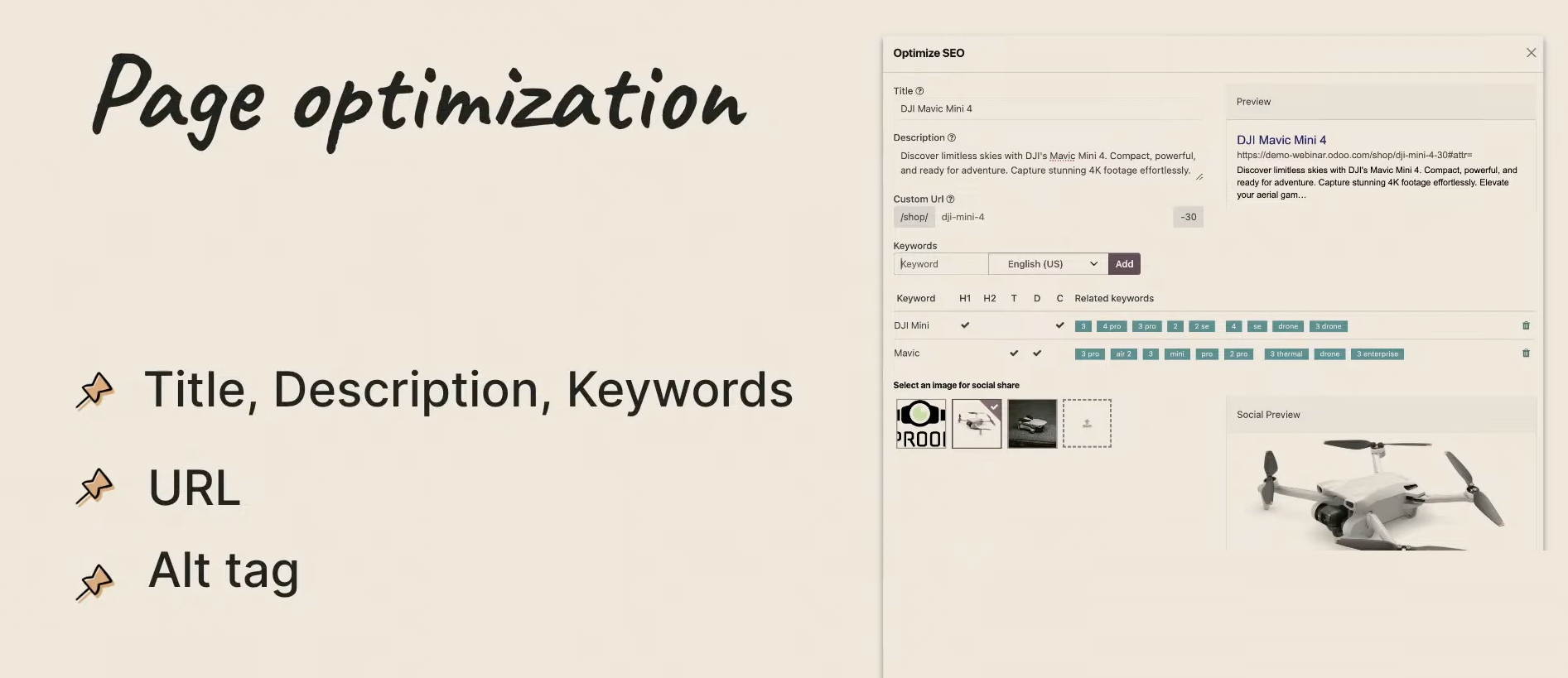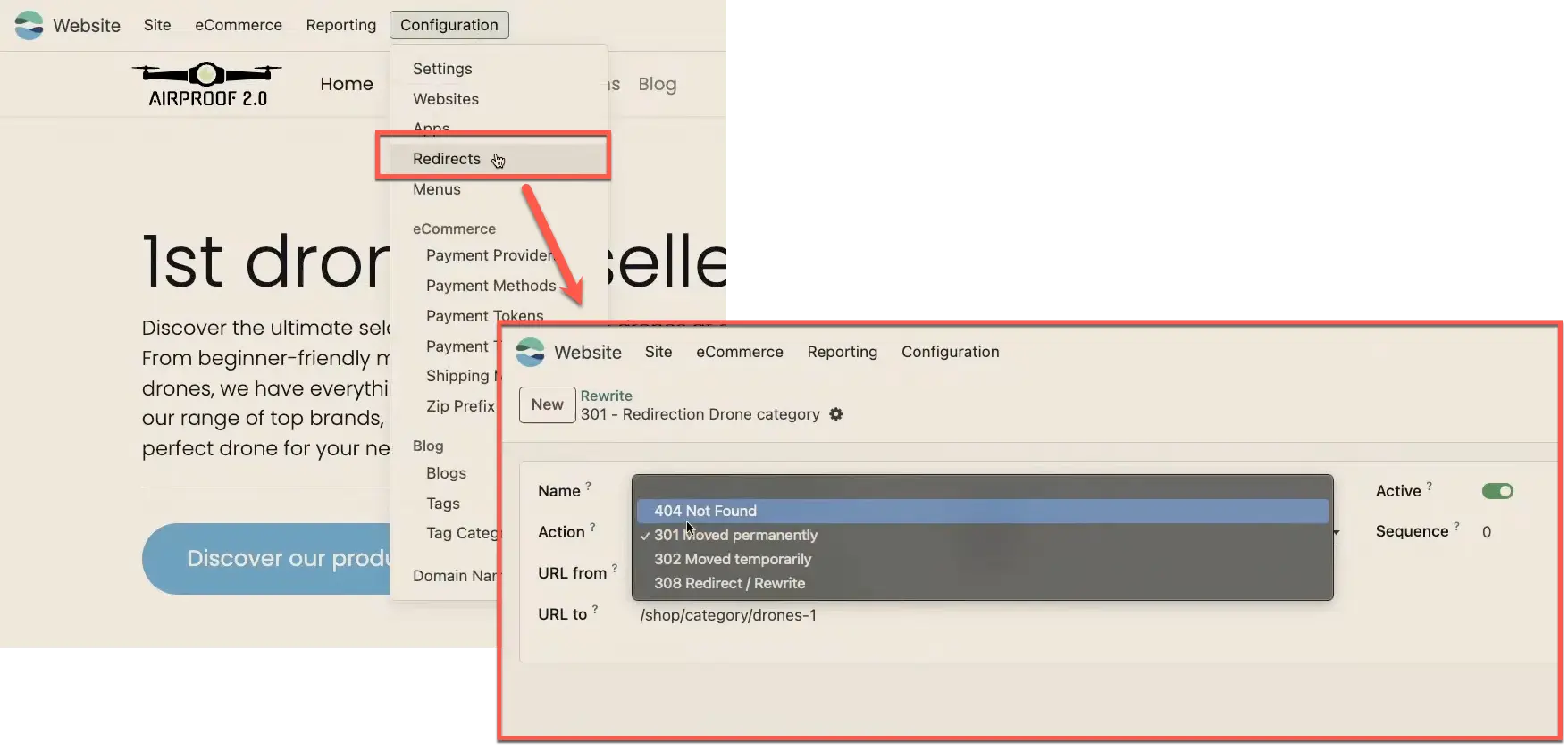In the competitive digital landscape, Search Engine Optimisation (SEO) is essential for enhancing online visibility, climbing search engine rankings, and driving more traffic and revenue. Achieving SEO success requires a multifaceted approach and continuous effort. The "Mastering SEO with Odoo" webinar provided an in-depth look at leveraging Odoo to streamline SEO efforts and secure a prominent online presence.
The Core of SEO: Visibility, Traffic, and Revenue
SEO aims to improve your website's visibility on search engines like Google. By increasing your ranking in search results through targeted techniques, you attract more visitors. The formula is straightforward: more visibility equals more traffic, leading to increased revenue. However, there's no magic button for SEO; it demands a comprehensive, ongoing strategy.
Odoo's Approach to Technical SEO
Odoo simplifies the technical aspects of SEO, ensuring your website meets search engines' requirements:
- Mobile Responsiveness: Odoo ensures your site is accessible and user-friendly across all devices, a crucial factor given the predominance of mobile traffic.
- Image Optimisation: Automatically optimises images for quick loading, enhancing site performance without sacrificing quality.
- Automatic Sitemap Generation: Facilitates efficient crawling and indexing by search engines, aiding in better visibility.

Content: The King of SEO
Quality content enriched with strategically chosen keywords is vital for higher search engine rankings. Odoo offers robust tools for content creation and optimisation:
Leveraging Keyword Planner
Using tools like Google's Keyword Planner helps identify and integrate relevant keywords into your content, making it more discoverable.
Blogging: A Strategic SEO Tool
Blogs are powerful for SEO, establishing your site as a valuable resource and enhancing its ranking. Odoo facilitates easy internal linking within blog posts, bolstering SEO efforts.
Internal Linking and Backlinking: Weaving a Web of Connections
Internal Linking
Odoo enables the creation of a coherent internal linking structure, guiding users and search engine bots through your site and emphasising the hierarchy and importance of your pages. This not only improves user navigation but also boosts your SEO by showing search engines the relationships between your content.
Backlinking
Backlinks, or links from other reputable sites to yours, are invaluable in building your site's authority. The webinar highlighted strategies for earning these links, such as creating shareable content and engaging with your industry community. Odoo's blog platform can be a pivotal tool in generating content that earns backlinks, further enhancing your site's SEO.
Navigating Content Migration and URL Redirection
When migrating to Odoo or updating your site, preserving and enhancing your SEO standing is crucial:
Content Migration
Ensures a seamless transition of your product catalogue, metadata, text content, and images without losing SEO momentum.
URL Redirection
Manages redirections from old URLs to new ones through a redirection table, maintaining SEO equity.

Odoo's Comprehensive SEO Service
Odoo's SEO service aims to elevate your online strategy, offering:
- Audit: Analyses your current website and SEO practices.
- Structure Proposition: Provides expert recommendations for site structure optimisation.
- Keywords Proposition: Guides on selecting impactful keywords.
- SEO Training: Offers insights into managing your SEO strategy effectively.
- Go Live Checklist: Ensures your site is optimised before launch.
Q&A Highlights
- Odoo vs. WordPress Performance: No direct third-party benchmarks compare Odoo and WordPress website performance. Performance varies based on many factors, but Odoo stays updated with technical innovations to ensure optimal speed.
- Odoo Website Solution: The Odoo website solution is integrated with the ERP system, not sold separately, offering a significant advantage by connecting with all other applications within the system.
- Costs: Using your own domain might be the only additional cost on top of the Odoo system licence. Odoo provides a free SSL certificate, and the domain is free for the first year.
- Domain Ownership Verification: Odoo allows easy verification of domain ownership by copying the verification code from Google's HTML file into Odoo's settings.
- Performance Boosting: While Odoo manages most technical aspects, performance can be influenced by external scripts and image sizes. Recommendations include using webp format for images and aiming for load times between two and three seconds.
- URL Path Changes: Standard Odoo does not support changing URL paths like "/shop" to "/prod-page" without custom development.
- Breadcrumbs: Breadcrumbs are included on shop and blog pages in Odoo, with custom additions requiring development.
- Database Deletion in Odoo 17: Databases can be deleted through Odoo's database management portal, with unused databases expiring after a certain period.
- Installing GA4 and GTM: Google Analytics 4 and Google Tag Manager can be installed in Odoo without coding knowledge by pasting code snippets into designated areas.
- Content Updates for SEO: Quality content is more important than the frequency of updates, though regularly posting new blog articles is beneficial for SEO.
- Hosting Multiple Websites: Odoo supports hosting multiple websites on the same database, each with its own domain, allowing for separate B2B and B2C sites.
- Subdomain Redirection: Redirection of a subdomain to an external URL is managed through your domain manager, not within Odoo.
- Upgrading Odoo Versions: Upgrades from one version to the next, like Odoo 16 to 17, are included in the system's price if there are no custom developments.
- Cookie Bar Enhancements: Discussions about enhancing the cookie bar in Odoo are ongoing, with no confirmed plans yet.
- Custom Sitemaps: Standard Odoo does not support adding custom sitemaps generated by third-party tools without custom development.
- Addressing Cumulative Layout Shift: Strategies like lazy loading images may help, with feedback and suggestions for improvement welcome at Odoo support.
The "Mastering SEO with Odoo" webinar emphasised the importance of a holistic SEO strategy, combining technical optimisation, strategic content creation, internal linking, and back-linking practices. With Odoo's suite of tools and services, businesses are well-equipped to improve their online visibility, ascend in search engine rankings, and drive increased traffic and revenue.
By leveraging Odoo's capabilities and adhering to SEO best practices, companies can achieve sustainable success in the digital marketplace.


Mastering SEO with Odoo